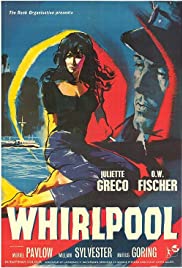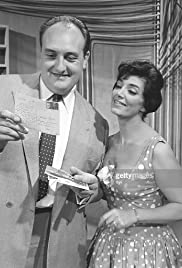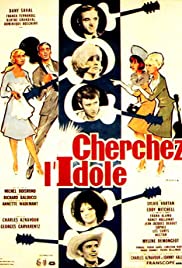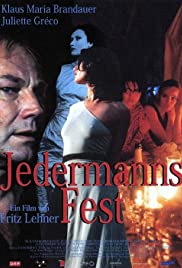He is alive. Greece, the 1960s. Doctor Gregorios Lambrakis (Yves Montand) leader of the opposition is injured during an anti-military/nuclear demonstration in an incident that causes his death. The government and army are trying to suppress the truth – their involvement with a right-wing organisation in a covert assassination. But they don’t control the hospital where Lambrakis is brought and the autopsy reveals the cause of death. Then tenacious Examining Magistrate (Jean-Louis Trintignant) is determined to not to let them get away with it despite every witness getting beaten up en route to his office … Always blame the Americans. Even if you’re wrong. Adapted from Vassilis Vassilikos’ 1966 novel by Greek-born director Costa-Gavras and Jorge Semprun (with uncredited work by blacklisted Ben Barzman), this political thriller gained its frisson and urgency from its lightly fictionalised portrayal of recent events in Greece which this more or less accurately depicts. Nowadays its style is commonplace but its skill in evoking the dangers of the official version and the suppression of free speech is more important than ever. Inspired by real-life events, including the ‘disappearing’ of opposition Moroccan politician Mehdi Ben Barka in Paris in 1965, with a surgical reference to JFK, the beauty of the construction is in having Montand’s experiences including with wife Helene (Irene Papas) dominating the first half, while the second is about the steady work of investigation carried out by Trintignant, who winds up unmasking a conspiracy at the highest level. Beautifully shot by Raoul Coutard and scored by Mikis Theodorakis. Tough, taut, suspenseful filmmaking that is exciting and dreadful simultaneously, speaking truth to power about corruption, passionate engagement and the casual use of street thugs to commit murder for the state. There is even room for humour as Trintignant insists on treating the officers like anyone else when they are indicted and each one of them believes him to be a Communist when in fact his right wing credentials are impeccable. In real life the military junta came to power and banned the venerable Papas, who was a member of the Communist Party: she wasn’t the only one of course but she survived to celebrate her 94th birthday on 3rd September last. Essential cinema. Why do the ideas we stand for incite such violence?
Monthly Archives: September 2020
Gabriel Byrne Does Euro Disco
First broadcast 40 years ago on RTE TV Ireland’s state broadcaster, this Barry Devlin composition featured the actor on vocals with Twink, The video co-stars May Pang and Pandora Moore. For your pleasure.

A Man and a Woman (1966)
Aka Un homme et une femme. If I had to go through this again what would I do? Widowed script girl Anne Gauthier (Anouk Aimee) travels from her home in Paris to Deauville to visit her little girl Francoise (Souad Amidou) at boarding school in Deauville. She accepts a lift back with racing driver Jean-Louis Duroc who is a widower visiting his little boy Antoine (Antoine Sire). A friendship blossoms into romance but she can’t tell him her husband Pierre (Pierre Barouh) is dead and speaks of Pierre in the present tense, confusing their perceptions of each other. His wife Valerie (Valerie Lagrange) committed suicide when she saw him in a near-fatal accident and believed he died. But he survived. Now when he races in icy conditions on the Riviera in the Monte Carlo rally Anne watches the coverage on the radio (voiced by presenter Gerard Sire, father of Antoine) and sends him a telegram saying she loves him and he drives back north in his Mustang to see her … Why? Just your everyday story of a widowed script girl meeting cute with a widowed racing driver. From this slim premise evolved a glorious melodrama. Two of the most beautiful people to ever grace the earth in a romantic movie about movie-making and romance: this is how the Nouvelle Vague was repackaged and commercialised by writer/director Claude Lelouch and it was a cultural phenomenon in its day, a Palme d’Or winner at Cannes, an Academy Award winner for Best Foreign Film and Original Screenplay as well as a huge box office success on both sides of the Atlantic. Shot quickly with just seven crew on a low budget, the flashy techniques were born of necessity. Different black and white film stocks were used until an American distributor contributed more money upfront enabling Lelouch to buy colour film. The old cameras used had to be covered in blankets to protect them from wintry damp – there was a lot of rain on those supposedly exotic resort locations: the antithesis of glamour. Yet did any actors ever wear sheepskin coats so well?! Trintignant was on board first and it was he who suggested Aimee as his co-star when Lelouch asked him who would be his ideal woman. They were old friends. When she closes her eyes during their scenes of radiant intimacy she paradoxically creates an even more empathetic heroine, this woman who can’t come to terms with her husband’s death. This is always about how the mind works to permit people to fall in love in the aftermath of unspeakable tragedy. Danger underlines everything – these men who love Anne dally with it in their daily occupations. Hope is a little beyond her, the future unthinkable. Isn’t death the ultimate subject of all art? The film’s conclusion was kept secret from Aimee: that’s real surprise registering on her gravely luminous face. The score by Francis Lai is simply unforgettable. It was written before the production commenced and Lelouch used playback during the scenes to inspire the performers who where encouraged to improvise their dialogue. Lelouch said of working with Trintignant: I think Jean-Louis is the actor who taught me how to direct actors. We really brought each other a lot. He changed his method of acting while working with me, and I began to truly understand what directing actors was all about, working with him. I think the relationship between a director and actor is the same relationship as in a love story between two people. One cannot direct an actor if you do not love him or her. And he cannot be good if he or she does not love you in turn. How astonishing has Trintignant been in the evolution of contemporary romantic dramas? Starting with And God Created Woman, A Man and A Woman, through Amour, he is the cornerstone of how we perceive the male psyche from the 1950s onwards. He will celebrate his 90th birthday December 2020. Co-written with Pierre Uytterhoeven. Not just a film, this is a landmark in cinema. If you ever find yourself in Deauville you can book into the suite named for the film at the Hotel Barriere Le Normandy. Some Sundays start well and end badly
Miranda (1948)
There’s a dreadful shortage of men below sea. With his wife Clare (Googie Withers) uninterested in fishing, Dr. Paul Martin (Griffith Jones) goes on holiday in Cornwall. There he snags mermaid Miranda Trewella (Glynis Johns) and is pulled into the water. She keeps him prisoner in her underwater cavern and only lets him go after he agrees to show her London. He disguises her as an invalid patient in a wheelchair and takes her to his flat for a month-long stay. Clare reluctantly agrees to the arrangement, but gets him to hire someone to look after their house guest and he selects Nurse Carey (Margaret Rutherford) for the eccentric nature that previously caused him to get rid of her and takes her into his confidence. To Paul’s relief, Carey is delighted to be working for a mermaid as she always believed they exist. Miranda’s seductive nature earns her the admiration of not only Paul, but also his chauffeur Charles (David Tomlinson), as well as Nigel (John McCallum), the artist fiancé of Clare’s friend and upstairs neighbour Isobel (Sonia Holm) arousing the jealousy of the women in their lives. Clare starts to follow her instincts and starts reading up on her suspicions. Nigel breaks off his engagement, but then he and Charles discover that Miranda has been flirting with both of them …. You’ve hated me ever since I set tail in this house. The delightful Johns has fun as the beguiling mermaid who insinuates herself into the life of a doctor living quite the de luxe life in his well appointed London apartment with his lovely wife Withers. And then she drives every man mad with desire. There are lovely moments when she can’t help herself – snacking on the goldfish straight from the bowl, scarfing cockles at the fish market and depriving a sea lion of his lunch on a trip to the zoo. Witty and surprising, this wastes no time in introducing Johns – two minutes – and once she fishes Paul out of the water and into her cave she wastes no time in telling him she had to throw the last two men back because their legs were too short. She has a disarming way of critiquing men’s physiques to their face. Withers plays opposite offscreen husband McCallum while the redoubtable Rutherford has an amusing scene in a museum with a mummy and off-screen husband Stringer Davis. Witty, charming fluff with Johns as bewitching as ever as the flirty fish out of water and some timely references including the novel Forever Amber – which plants the suggestive conclusion. Adapted from his play by Peter Blackmore with additional dialogue by Denis Waldock, this was produced by Betty Box and directed by Ken Annakin. Tail by Dunlop. There is a sequel, made 6 years later, Mad About Men. If you ask me there’s something very fishy about this case
Crossfire (1947)
He’s just one guy. We don’t get them very often. But he grows out of all the rest. When he is called in to investigate the brutal murder of Joseph Samuels (Sam Levene), who was found dead at his home, police investigator Captain Finlay (Robert Young) discovers there may be a murderer among a group of demobilized soldiers, who had been seen with Samuels and his female friend at a hotel bar that night. Meanwhile, Sergeant Peter Keeley (Robert Mitchum), concerned that his friend Mitchell (George Cooper) may be the prime suspect, decides to investigate the murder to clear his friend’s name. To both investigators, each suspected soldier relays his version of that night through flashback. The first to step up is Montgomery (Robert Ryan) who reveals himself to be anti-semitic; the others are Floyd Bowers (Steve Brodie), Mitchell and a potential witness, Ginny Tremaine (Gloria Grahame). While Finlay and Keeley slowly piece together the fragments of that night, there is one possible motive that may have driven the killer to beat an innocent to death, which prompts Finlay to set up a trap to expose the killer…. You can tell a lot about a man by how he don’t respect the service. Adapted from future writer/director Richard Brooks’ controversial novel The Brick Foxhole but of course anti-semitism wasn’t the book’s subject – that would be homophobia, unmentionable as a perversion in those heady days of the Hays Code, as was the issue of inchoate violence among demobbed GIs. John Paxton’s exemplary screenplay still tells a great story with flashbacks used to illuminate the mindset of the killer on the run, with Ryan brilliantly embodying the murderer and Mitchum’s outwardly dozy persona deployed to good effect: Instead of the purple heart we get purple ink. Brodie makes a good impression as the fall guy. It wears its politics on its sleeve with plenty of on-the-nose dialogue particularly from Young: Hating is always the same. Always senseless. Yet it falls right. He gets a great speech about how there’s always a minority targeted for hatred and regales a story about his own ancestor, an Irish Catholic murdered for emigrating from the Famine and establishing a home in the US. Effectively a pursuit film – a disguised western, if you will – everyone knows whodunnit and the chase just gives him time to talk himself into a hangman’s noose. Made at a turbulent time for the industry, this B movie astonished many by being nominated for an Academy Award. An outstanding example of the message movie, dealing with the thorny issue of what GIs yet to be discharged from WW2 service were up to with tensions running high in the changing post-war world, every woman potentially a femme fatale: Grahame excels as the tough lady men want to have ruin them. We’re too used to fightin’ but we just don’t know what to fight. Produced by Adrian Scott (the son of Irish Catholics) and directed by Edward Dmytryk both of whom suffered differently in the wake of the HUAC hearings that this film ironically helped bring about – both were blacklisted among the Hollywood Ten, but in 1951 Dmytryk gave people up in order to work again. They had previously collaborated with Paxton on Murder My Sweet, Cornered and So Well Remembered. After this landmark production, RKO fired them. Scott moved to Europe and wife Anne Shirley wrote him a ‘Dear John’ letter, marrying another screenwriter, Charles Lederer. Scott’s next wife, Joan, provided a front for him to get work pseudonymously, mainly in British TV. He died at the age of 61. Ryan would star for Dmytryk in the wonderful western The Professionals 19 years later. Dmytryk died at the age of 90 in 1999. I don’t like Jews and I don’t like nobody who likes Jews
Trent’s Last Case (1952)
The crowd is very friendly. English newsman Philip Trent (Michael Wilding) wants to retire and carry on with his art but he is lured back to the fray and reckons American business tycoon Sigsbee Manerson’s (Orson Welles) suicide was murder and that his widow Margaret’s (Margaret Lockwood) lover John Marlowe (John McCallum) did it but a series of interviews yield a very different perspective … Never cultivate a luxury until you can afford to support it as a habit. The third version of the 1913 E.C Bentley murder mystery adapted here by Pamela Bower is a stop-start affair with three flashbacks giving us the story as it might have been, a la Rashomon or even Stage Fright (which also starred Wilding) but there’s so much repetitive staging it might be twenty-three. Producer/director Herbert Wilcox had made a star of his wife Anna Neagle and for reasons one suspects might be nefarious gave her box office rival Lockwood her comeback here after two years away and tied her to a contract that ended her screen career. Hmm. One staid hour in finally sees the appearance of Welles (in the style of The Third Man) or more properly his huge prosthetic proboscis and the brows which enter the room ahead of him, then the plot really unfurls and it’s not as straightforward as the outline suggests. Kenneth Williams gives his best Welsh accent in the witness box, Sam Kydd shows up as a policeman and there’s an opportunity to see the acclaimed pianist Eileen Joyce perform in the concert sequence. For the second time the Manderson case is closed
Motherless Brooklyn (2019)
I got shot with my own gun. Lionel Essrog (Edward Norton) is a lonely private detective who doesn’t let Tourette’s syndrome stand in the way of his job. Gifted with a few clues and an obsessive mind, Lionel sets out to solve the murder of Frank Minna (Bruce Willis) his mentor and only friend while they’re out on a job. Scouring the jazz clubs and slums of Brooklyn and Harlem, Essrog soon uncovers a web of secrets while contending with thugs, corruption and the most dangerous man in the city, Moses Randolph (Alec Baldwin) famed for building parks but in reality lining the pockets of his fellow investors in building corporations. Meanwhile Lionel finds that the half-caste daughter Laura Rose (Gugu Mbatah-Raw) who campaigns against housing discrimination may be connected with him. And the man supplying him with information on Randolph (Willem Dafoe) is not quite who he claims to be … Everybody looks like everybody to me. Star and director Edward Norton loved Jonathan Lethem’s 1999 novel and determined to adapt it when it was published but this bears virtually no connection with its source material, setting it forty years earlier and fusing a variation on the plot of Chinatown with Robert Caro’s 1974 biography of Robert Moses. It takes its sweet time to bed in and Norton’s character’s tics are immensely irritating even offputting. Once it settles into being a private eye flick it’s a better fit with the tone and the tropes work well – surveillance, shady operators, mistaken identity, chases, beatings and – just like Jake Gittes – going to a public meeting and then looking up files in City Hall. The issue of race and miscegenation replaces the incest plot but it’s all about power. Baldwin is at his best declaiming and he has some good lines here: Do you have the first inkling how power works? The plot really kicks in when Norton works out who Dafoe really is. Norton asserts his own peculiar charms as the disabled guy whose problem ironically makes people think he’s dumb and uses that to his advantage. Either that or a sugar shaker. Wonderfully shot by Dick Pope, this is a tad long but ultimately a rather intriguing throwback noir melodrama with straightforward political commentary about slum clearance, ghettoising and corruption. This is not a programme for slum removal. This is a programme for negro removal
Anna Karenina (1948)
Each unhappy family is unhappy in its own way. St Petersburg, 1870s. Anna Karenina (Vivien Leigh) is married to dull government official Alexei Karenin (Ralph Richardson) who is apparently more interested in his career than in satisfying the emotional needs of his wife. Called to Moscow by her brother Stepan Oblonsky (Hugh Dempster), a reprobate who has been serially unfaithful to his trusting wife Dolly (Mary Kerridge), who he wishes Anna to placate, Anna meets Countess Vronsky (Helen Haye) on the night train. They discuss their sons, with the Countess showing Anna a picture of her son Count Vronsky (Kieron Moore), a cavalry officer. When he shows up at the railway station to meet his mother it’s lust at first sight. Each of them eventually gives up everything for the other and their baby dies in childbirth while Anna is seriously ill but her husband forgives her the indiscretion that has scandalised them both when she appears to be close to death. Anna has to choose which man with whom to live and risk giving up her young son by her husband and going into exile abroad with Vronsky. Upon their return to Russia Anna is shunned … You’ve no idea what women like. The tragic love story at the centre of Tolstoy’s 1877 novel is a consistent literary trap for filmmakers. Despite the opulent style this Alexander Korda vehicle for Vivien Leigh is occasionally stillborn. It should be perfect casting but Leigh is pretty vacant at times, imperious and persuasive at others, in comparison with the supposedly unsuitable Garbo’s positive radiance in the role a decade earlier, while Moore is wholly wrong as Vronsky. At first. And yet Leigh becomes fabulously fatalistic in that sobering Russian way while Moore gives up everything for her and they never quite understand or trust each other, their emotionality overwhelming them in different ways. Meanwhile her righteous husband maintains his pomposity by referring to his Christian principles and refuses her a divorce, to utterly awful effect. Women are the pivot. Adapted by Jean Anouilh & Guy Morgan and director Julien Duvivier, this long film is compromised by the tone which takes its time to exude the sheer joy of the illicit sexual attraction thereby somewhat pre-empting the nature of the tragedy to come. There are some terrific set pieces and wonderful deep focus cinematography by Henri Alekan with incredible costumes by Cecil Beaton. Overall it’s a rewarding watch that was an unexpected disaster. But was that such a surprise? Scarlett O’Hara dumping her family and frolicking with a soldier in the aftermath of World War 2 while post-war privations were at a height? Better than its reputation would suggest. The last scene is rightly shocking. And the light by which she had been reading the book of life, blazed up suddenly, illuminating those pages that had been dark, then flickered, grew dim, and went out forever
Juliette Greco 7th February 1927 – 23rd September 2020




The death has taken place of post-war French icon Juliette Greco at the great age of 93. A chanteuse in the national tradition she became internationally known not just as a singer but as an actress when she was cast in several English-language films in the Fifties, a time when she enjoyed a relationship with Hollywood studio head Darryl F. Zanuck. He was one of her many famous boyfriends – including Albert Camus and Miles Davis. She was married three times, including to actor Michel Piccoli. She seemed to embody the whole intellectual idea of ‘Frenchness’ for several generations – bohemian, leftwing, Left Bank, wearing black turtlenecks, smoking Gauloises and emanating an ineffable cool. She had an incredible image but she backed it up with outrageous talent, projecting the nuances of those songs she made her own: Sartre said she had ‘millions of poems in her voice’. She was the basis for the singer in his trilogy The Roads to Freedom. The Beatles idolised her and wrote songs about her. As a trained ballerina her entire being appeared to act with paradoxical stillness. Her first good leading role was in Cocteau’s Orphee and how startling she is making that entrance as Aglaonice; later she had a great role as a nun returning to the outside world in When You Read This Letter. She held her own in a cast that boasted Tyrone Power, Errol Flynn and Ava Gardner in The Sun Also Rises with a small but pivotal role. Later she would excel in The Roots of Heaven. One of her last roles was opposite fellow musician Jacques Brel in his film Far West. With her goes something of the French nation, certainly what we believed it to be in the twentieth century. Rest in peace, Madame.


















































